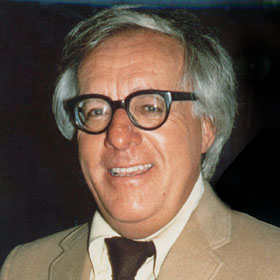Ray Bradbury, Author Of 'Fahrenheit 451,' Dead At 91
Author Ray Bradbury, who is most commonly known for his dystopian narrative on censorship Fahrenheit 451, died peacefully Tuesday night in his Los Angeles home. His daughter announced the news early Wednesday morning. He was 91.
Bradbury reached wide acclaim as the author of 27 novels (including the popular sci-fi book The Martian Chronicles) and over 600 short stories, as well as for having helped pen some of the mind-warping episodes of The Twilight Zone. Fahrenheit 451, which he wrote over the course of a few months while hunched over a 10 cents per half hour typewriter in the basement of the UCLA library, made him famous — and, in some cases, infamous. In the end, it cost him a total of $9.80 to finish the first draft, as Bradbury revealed to NPR.
Bradbury's lyrical descriptions of uncertain futures fraught with anxiety reached greater depth through his lens —one that expressed both the optimism and weariness of post-war America after the invention of the atomic bomb. His writings were often a juxtaposition of the enthrallment of technological advancement to the destructive nature of humankind. “I’m surrounded by my metaphors,” Bradbury told the New York Times in 2007, admitting the science in his books serves only as the vehicle for his creative ideas to flourish. Not giving too much thought to the accuracy of the details, he let the scientists worry about the particulars.
Regardless of the genre Bradbury himself ascribed to his work (he called it fantasy, not science fiction), he is often credited with lifting the sci-fi genre from mere entertainment to the realms of high literature. He transformed his childhood fears, of death and Cold War paranoia, into speculations on Martian life and high-tech (but not so far-fetched) futures, where firemen torch books instead of quelling the flames. “When I was born in 1920,” he once said, “the auto was only 20 years old. Radio didn’t exist. TV didn’t exist. I was born at just the right time to write about all of these things.” In the autobiographical essay he wrote for The New Yorker he explained this childhood as “one frenzy after one elation after one enthusiasm after one hysteria after another.” Noting, “You rarely have such fevers later in life that fill your entire day with emotion.”
In 2007, Bradbury received a special citation from The Pulitzer Board “for his distinguished, prolific, and deeply influential career as an unmatched author of science fiction and fantasy,” although his books were never awarded the prize. “He influenced so many artists, writers, teachers, scientists, and it’s always really touching and comforting to hear their stories.”
Danny Karapetian, Bradbury’s grandson, said his grandpa was a child at heart. “His legacy lives on in his monumental body of books, film, television, and theater, but more importantly, in the minds and hearts of anyone who read him, because to read him was to know him. He was the biggest kid I know," he told science website io9.
Karapetian also honored Bradbury by reading an excerpt taken from his novel, The Illustrated Man: “My tunes and numbers are here. They have filled my years, the years when I refused to die. And in order to do that I wrote, I wrote, I wrote, at noon or 3 A.M. So as not to be dead.”
—SIOBHAN MCBRIDE
RELATED ARTICLES
Get the most-revealing celebrity conversations with the uInterview podcast!




![HBO Shares First ‘Fahrenheit 451’ Trailer [VIDEO]](/blank.gif)



Leave a comment